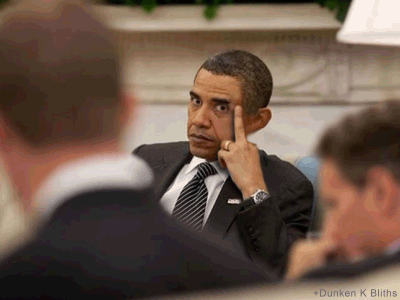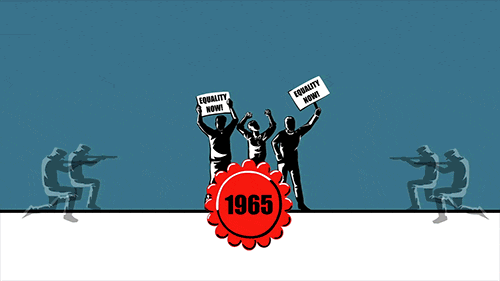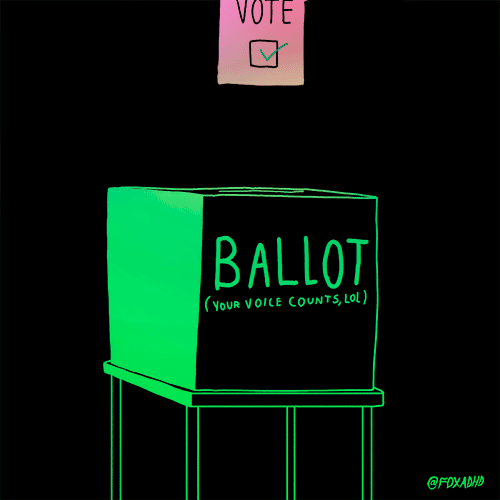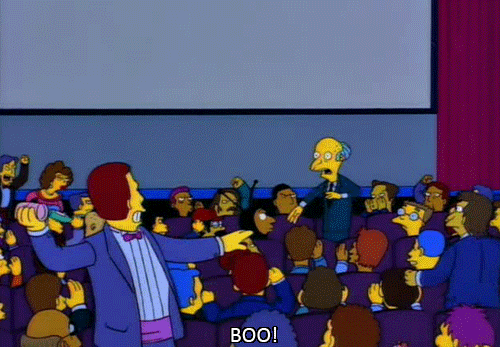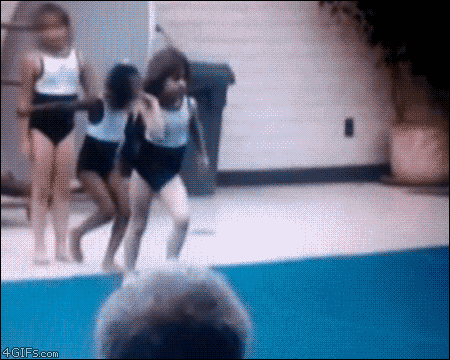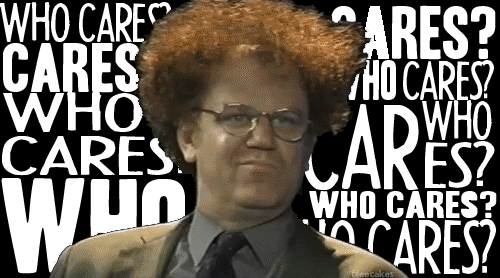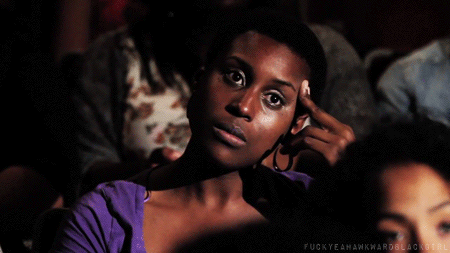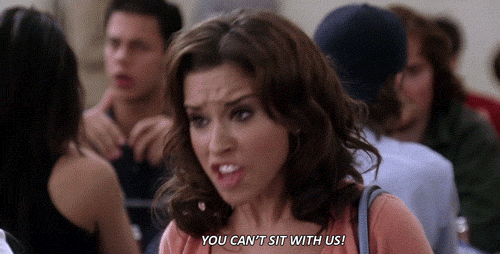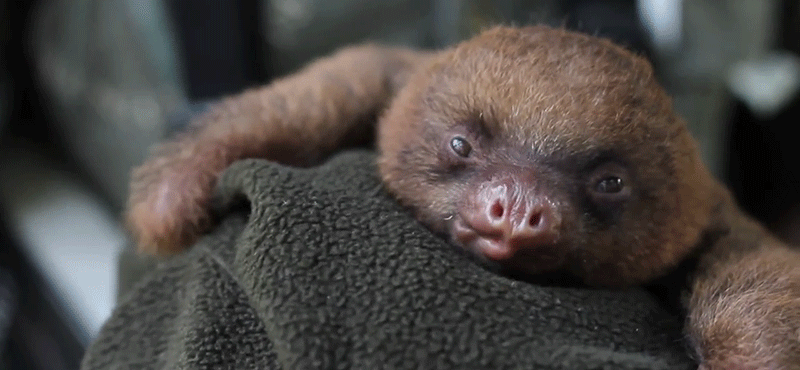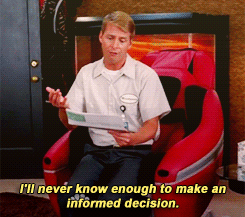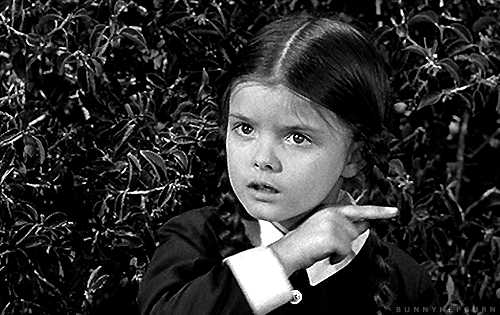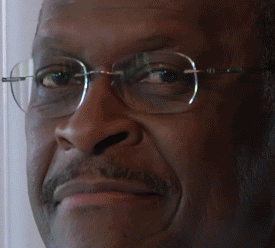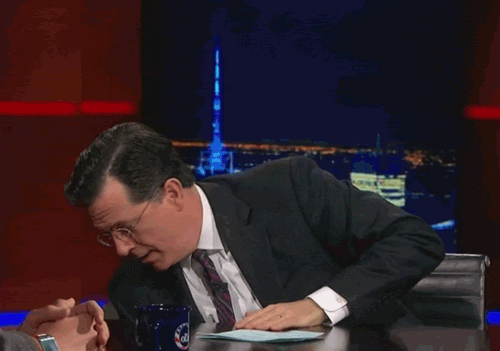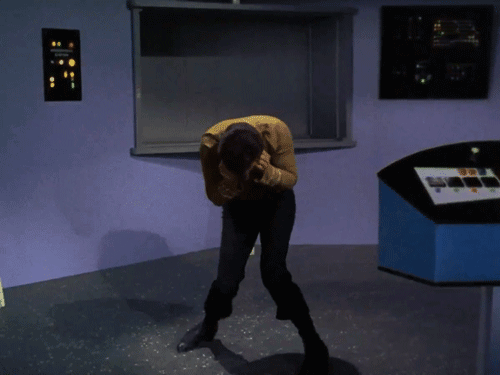What’s Up With All These Voting Restrictions?: A GIF-splanation
In which I GIF-splain the voting restrictions shenanigans that may affect the upcoming midterms. Grab a beverage, because this is a long'un.
It’s that time of year again: election season! And you’re confused, especially when it comes to voter ID requirements and other restrictions throughout the country. I know you are. It’s hard not to be, what with all the laws that have been passed, the suits that have been filed challenging these laws, and the courts blocking some of these laws and not blocking others. It’s enough to make anyone closely following this stuff want to dramatically throw themselves off the bottom stair.
No wonder many questions are looming: Do you need an ID? What kind of ID do you need? Are you going to be required to hand over your first-born child to the nearest poll watcher before you pull the proverbial lever?
If you know the answers to these questions, good for you! If you don’t, don’t feel bad. It seems like the whole point is to confuse the shit out of you so that you don’t even bother to vote. Because who has the time to track down your second-cousin twice removed’s birth certificate, just so you can prove that you’re eligible to vote? No one, that’s who.
But to help you out, I have created this handy GIF-splanation of what the heck is going on in the world of voting rights as we careen headlong toward November 4, 2014, so you can get through this trying time without scooping out your brains with a melon baller and filling the remaining empty skull cavity with margaritas.
Ready? Let’s go.
It goes without saying that this next election is going to be a doozy. It will determine whether Republicans will be able to wrestle the Senate from Democrats, giving Republicans control of Congress and thus activating what will most likely be referenced in history books as President “Fuck It” Obama—you know, the Obama who will be vetoing pretty much anything and everything that comes out of the Capitol while throwing up middle fingers to all who oppose him.
But beholding the glory of President Bite Me may depend on what the voting restrictions landscape looks like in any particular state.
As a whole, I can tell you what the voting restriction landscape looks like in this country. It looks like a dystopian post-apocalyptic wasteland:
But how did we get to this hellscape? To answer that question, let’s take a walk down memory lane.
R.I.P. Voting Rights Act. We Hardly Knew Ye.
So back when racism was fashionable—I mean, just look at these fancy robes—

—people decided to make it impossible for Black people to vote. Sure, there were constitutional amendments saying “Hey! Let Black people vote already!”—but due to discriminatory practices at the state and local level—poll taxes, literacy tests, and poll watchers milling about intimidating people—many Black people were prevented from actually exercising their right to vote.
Tired of being pushed around, Black people took to the streets. Some white folks were like “NOOOOOOPE! We love Jim Crow!” and decided to beat and murder anyone who had the nerve to try to exercise their right to vote.
Despite these bigots’ best efforts, they lost: Lyndon Johnson signed into law the Voting Rights Act of 1965. It was one of the most sweeping pieces of civil rights legislation in history.
And it worked! Voter turnout among the previously disenfranchised increased, and some Black people were even elected to office!
But then last year in Shelby v. Holder, the Supreme Court struck down a key provision of the Voting Rights Act, essentially declaring racism dead. This is pretty hilarious, considering the fact that racism is totally not dead.
The key provision that the Court struck down? Section 4, which is the coverage formula used to determine which states must get pre-clearance from the Department of Justice or the District Court for the District of Columbia before making any changes to their election laws.
Why did certain states have to get pre-clearance? Because the government didn’t trust certain states not to enact laws that basically said, “Everyone can vote! Except you, Black person.”
Most of the states subject to pre-clearance were southern, because the racism was really delicious there: Texas, South Carolina, Georgia, Louisiana, Mississippi, Alabama, and Virginia. Alaska and Arizona were also subject to pre-clearance because, historically, they haven’t been too keen on having Asian-Americans, Latinos, American Indians, and Alaska Natives vote.
The Supreme Court left Section 5—the actual pre-clearance requirement—in place, but without Section 4(b), there are no states left to which the pre-clearance requirement can be applied.
Now mind you, some of the justices would have been happy to do away with Section 5, too: During oral arguments, Justice Antonin Scalia went as far as to call the pre-clearance requirement in Section 5 the “perpetuation of a racial entitlement.”
He really said that!
Almost before the ink was dry on the Shelby decision, states that had been waiting for the decision immediately implemented various voting rights restrictions. Because of course they did.
Beware the Brown Menace
Why the rush to enact all of these laws?
Well, in case you hadn’t noticed, we’re getting browner as a nation. And that is terrifying to some people. And by “some people,” I mean “white people.”
And by “white people,” I don’t mean all white people, so you can stop typing and just calm down already. You, white person reading this article? You’re perfect. Don’t ever change. Especially if you’re my mom. (Hi Mom!)
But those other white people—you know, the ones who are terrified of the oncoming Brown Menace—should try being nicer to us, so that when we take over, they won’t reap what they have sown.
Jus’ sayin’.
And here’s another thing you might have noticed: There’s been a Black guy in the White House for the past six years, and he just refuses to move out.
I’m not saying these voting restriction laws are Blacky O’s fault, because that would be ridiculous, but Black and brown people were falling all over themselves to vote for him back in 2008—just gobs of people hanging out at the polls waiting to vote for the nation’s first Black president.
Needless to say, some people were none too pleased with this increase in voter turnout and immediately started crafting bills designed to depress voter turnout for the 2012 election.
Would it surprise you to find out that states with higher Black turnout are more likely to restrict voting?
No really! There was a study and everything!
Of course, voting restriction aficionados have never come right out and announced that they were trying to keep the Blacks™, the Browns™, the Poors™, and the College-Aged Whippersnappers™ from voting. Even though it’s fairly obvious that these voting restrictions are explicitly trying to keep the Blacks™, the Browns™, the Poors™, and the College-Aged Whippersnappers™ from voting for candidates who would represent their interests, and who generally don’t belong to the party that is passing these voting restrictions willy-nilly.
Oh no, they didn’t admit to their nefarious scheming. Instead they complained about—*gasp*—VOTER FRAUD.
dunh dunh DUNNNNHHHHH.

Of course, when asked to provide evidence of any voter fraud, the people backing these ZOMG! VOTER FRAUD! claims had no response. This is unsurprising since there is no evidence—zero! zilch! nada!—of voter fraud.
Remember ACORN, the nonprofit community organizing group that found itself in the cross-hairs of conservative activists who desperately tried to prove that it was engaging in voting chicanery? Remember how it turned out that the Great ACORN Freak-Out was a big fat nothing burger?
Yeah that.
Nevertheless, a bunch of states kept crying about fraud and enacting laws that were supposed to combat all the fraud that no one could find any evidence of.
We all patted them on the head and wished them good luck in their fraud-huntin’ adventures—
—while the ACLU, the Brennan Center for Justice and other voting rights advocacy groups started filing lawsuits so they could duke it out in court.
Give Me Some Details, Already!
Now let’s move on to some specifics, ok?
I’m sure you’ve seen some of the media coverage over the past month or so about voter ID laws and other voting restrictions, and if I were to sit here and GIF-splain all of them to you in grave detail, we’d be here until the cows come home.
And besides, if you want to know what’s going on with voting restrictions in every single state, you should head over to the Brennan Center for Justice’s website. It’s very thorough. Also? Mind-numbing.
So let’s just focus on some key states—the 14 states that have enacted voter ID laws since 2011, to be precise. Shall we?
We shall.
(Oh, and in case you want to know why it can be difficult for some people to get voter ID, read my explanation here.)
Because I’m nothing if not helpful, I’ve also added links to the relevant state websites so you can find out just what you need to vote on November 4. Just click on the state name. You’re welcome.
First, though, we’re going to talk about Ohio, even though it hasn’t enacted a voter ID law. Because seriously, Ohio? Get it together.
Ohio hasn’t yet passed a voter ID law, although there’s a push to do so based on—you guessed it—VOTER FRAUD.
However, Ohio has managed to do away with its early voting, which very well could suppress the hell out of some votes in the upcoming election.
Remember back in 2012 when the Obama campaign sued Ohio Secretary of State Jon Husted to force him to restore early voting? The court ruled against Husted, but he threw up middle fingers and was all, “Screw you, man!” And the judge was like, “Screw me?! No, screw you!” and ordered Husted to personally show up in court.
Ultimately, Husted backed down.
But where there’s a will, there’s a way. Cut to two years later, and Husted has successfully pushed forward with his plan to gut early voting.
Husted eliminated early voting on Sundays, which means no more “Souls to the Polls”—that’s when Black people organize transportation to the board of election for groups of folks, so they can vote right after church.
You know how Black people love them some church.
Husted also signed another bill that would eliminate the so-called “Golden Week,” which is a five-day period during which voters can register to vote and vote early on the same day.
Earlier this month, the U.S. Supreme Court upheld Ohio’s plans, much to the chagrin of one Attorney General Eric Holder, who had nothing but side-eye for Ohio officials.
Holder called the Ohio shenanigans a “major step backward,” warning that they would “disproportionately affect people with childcare responsibilities, hourly salaries, and reduced access to transportation—people who may have difficulty getting the polls at any other time, and who are much more likely to be low-income or minority individuals.”
But Ohio doesn’t give a crap. They’re all, “So?”
North Carolina’s voter ID law won’t go into full effect until 2016. During the upcoming election, poll officials will ask for ID—but not require it—and will provide notice that ID will be required in 2016.
But there’s a lot of other non-voter ID-related nonsense going on in North Carolina that you should understand.
North Carolina, you see, rushed to pass its voting restriction law the day after the Supreme Court issued its disastrous Shelby v. Holder decision, because if there’s one thing we know, it’s that North Carolina’s gonna North Carolina. It’s what North Carolina does best.
North Carolina’s bill is one of the worst in the country. The North Carolina legislature seemingly took the worst bills passed by a bunch of other states and crammed them into one crap sandwich. It’s so bad that then-Secretary of State Hillary Clinton called it “the greatest hits of voter suppression.”
In addition to a voter ID requirement, the bill includes reduction of the early voting period from 17 to 10 days, the elimination of same-day registration (which permitted voters to register and then vote at the same time during the early-voting period); a prohibition on the counting of provisional ballots cast outside of a voter’s correct voting precinct on Election Day; the expansion of allowable poll observers and voter challenges; the elimination of the discretion of county boards of election to keep the polls open an additional hour on Election Day in “extraordinary circumstances”; and the elimination of pre-registration of 16- and 17-year-olds who will not be 18 by the next election.
Got all that?
Earlier this month, the Fourth Circuit blocked certain provisions of the law from going into effect, restoring same-day registration and out-of-precinct voting, but didn’t block the provision which reduced early voting because it was too close to the election to do so.
However, the Court acknowledged that in rushing to pass the bill, North Carolina was basically picking up right where it had left off in 1965.
A week later, the U.S. Supreme Court reinstated the provisions the Fourth Circuit had blocked. They didn’t say why, but speculation is that the Fourth Circuit’s ruling came too close to the election and changing the rules would have confused the hell out of everybody.
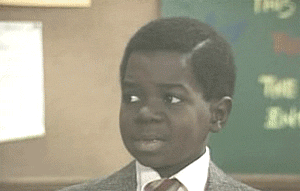
Seems like in North Carolina, they really really don’t want people to vote. In fact, one federal judge, James Wynn, Jr., asked, “How come the state of North Carolina doesn’t want people to vote?”
We all know the answer to that, don’t we?
Texas sought pre-clearance for its voter ID law in August of 2012 and was denied. After Shelby v. Holder, however, Texas was no longer required to seek pre-clearance. So, on the very day that the Supreme Court issued the Shelby ruling, Texas rushed to implement its law.
The same day!
Needless to say, a bunch of people sued. Just this month, a federal district court ruled that Texas’ law is an unconstitutional poll tax that would result in fewer Blacks™ and Browns™ exercising their right to vote.
The court also ruled that Texas’ reasons for enacting such a strict law were poppycock. The Texas legislature claimed they were trying to prevent voter impersonation fraud. But the legislature didn’t have any evidence of such fraud, and the rest of the silly reasons the legislature invoked—restoring voter confidence and increasing voter turnout—were soundly rejected.
Voting enthusiasts in Texas breathed a sigh of relief.
But then came the Fifth Circuit, which reinstated the law. Given the HB 2 shenanigans, the Fifth Circuit has officially become my least favorite circuit court of appeals—like, if the Fifth Circuit wanted to sit next to me in the cafeteria, I’d put my book bag on the seat and stare straight ahead, pretending that I couldn’t hear the Fifth Circuit asking me if it could sit down.
The Fifth Circuit cited the “value of preserving the status quo” as being too important this close to an election and said that blocking the law would “change the rules of the election too soon before the election date.” The court also said that it would be difficult for Texas to train poll workers in time, which makes sense in the sense that it makes no goddamn sense at all. All poll workers would have to do is not ask voters for ID.
I mean, come on.
No one is buying your logic, Fifth Circuit.
Well, no one except, perhaps, the U.S. Supreme Court which ruled on Saturday morning that Texas can enforce its voter ID law despite the lower court ruling that the law would disenfranchise Black and Latino voters and constitutes a poll tax.
You know—I’m not sure I want the Supreme Court sitting next to me in the cafeteria either. Hey SCOTUS? Go sit at the loser table with the Fifth Circuit.
Except you, Justices Ginsburg, Kagan, and Sotomayor. You ladies come sit by me.
After Wisconsin passed its voter ID law, the legislature decided to put some stank on their voter suppression efforts, and drafted up some bills that would have closed DMVs in heavily Democratic areas just to make sure that those pesky minorities, poor people, and whippersnappers would have an extra hard time getting the appropriate identification.
Neener Neener!
A bunch of folks filed a lawsuit calling bullshit on the voter ID law and, back in April of this year, a federal district court judge agreed. It determined that the law would not solve any purported voter impersonation problems—because “virtually no voter impersonation occurs in Wisconsin and it is exceedingly unlikely that voter impersonation will become a problem in Wisconsin in the foreseeable future.” The court also found that the law burdens mostly Black and Latino voters, to the tune of up to 300,000 voters.
Wisconsin appealed, and last month, a three-judge panel of the Seventh Circuit ruled that the law could immediately take effect just in time for the midterms, even though thousands of absentee ballots had already been mailed to voters under the old rules.
Then, last week, the U.S. Supreme Court overruled the Seventh Circuit and blocked Wisconsin’s law from taking effect.
Thank you, SCOTUS!
Alabama’s voter ID law went into effect on primary day in June of this year. To celebrate, Alabama Republicans decided to offer money to people who could help them find cases of voter fraud. (Seriously.) But on the other hand, as Zachary Roth pointed out, it wasn’t that hard to find voters who were disenfranchised by the law, like this adorable 93-year-old Black man named Willie Mims who has been voting since World War II:
Is someone cutting onions around here, or what?
Arkansas’ voter ID law is a hot mess. Arkansas is one of the few states that requires voters to provide proof of identity for absentee ballots, not just for ballots cast in person. Plus, Arkansas screwed up by not allowing a sufficient period of time for absentee voters to fix their ballot if their ballot was rejected for lack of photo ID.
To put this into context, during this year’s primary, one majority Black district—St. Francis County—saw 83 out of 102 absentee ballots rejected. That’s more than an 81 percent rejection rate!
Well done, Arkansas. Well done, indeed.
But never fear! In a unanimous decision, the Arkansas Supreme Court ruled that Arkansas’ voter ID law is unconstitutional.
In your face, Arkansas!
Kansas’ voter ID law was in effect for the 2012 election, and according to a study released by the U.S. Government Accountability Office, voter turnout took a big hit as a result.
Kris Kobach, Kansas’ Secretary of State, disagrees with the report, saying that the methodology was flawed. The GAO is standing by its study, calling it “robust and valid.” And frankly, who cares what Kris Kobach thinks.
Quit whining, Kris.
Voters in Mississippi approved a voter ID amendment to their constitution back in 2011. They had to wait for pre-clearance from the DOJ before passing any new voting laws because it’s Mississippi, that’s why. But after Shelby v. Holder, Mississippi was free to implement its law, just in time for the primary this past June.
Here’s an interesting tidbit: The voter ID law actually decided an election last month. In a tight race for alderman in Poplarville, Mississippi, between David “Glenn” Bolin and Stephanie Bounds, each candidate received 177 votes. One person showed up to the polls without voter ID and voted by affidavit. The only way for that person’s vote to have been counted would have been for she or he to show up with a valid ID within five days. That person never came back, probably because they didn’t want to be known about town as The Tie-Breaker.
So, the two candidates drew straws and Bolin won.
Oh, Mississippi—you’re so wacky!
North Dakota’s voter ID law is causing some consternation among Native people. If you’re a Native American, you’re permitted to use your tribal ID card as long as it has your address on it. This is a problem for the Spirit Lake, Sisseton-Wahpeton Oyate, and Turtle Mountain Band of Chippewa tribes, which constitute almost one-third of North Dakota’s Native population (of about 36,500 people)—and which do not include this information on their IDs.
Do better, North Dakota.
Back in 2012, the Department of Justice approved New Hampshire’s voter ID law. There are gobs of middle-class white people in New Hampshire and not many people of color, so no one really cared, since the primary concern about voter ID laws is disenfranchising the Browns™, the Blacks™ and the Poors™.
Nobody cares, New Hampshire.
Pennsylvania’s voter ID law was blocked by a state court in 2012, and back in May of this year, Gov. Corbett said he didn’t plan to appeal it.
Pennsylvania’s law is officially dead.
Nice try, Pennsylvania, but you failed.
In Rhode Island, a bunch of Black folks helped pass the voter ID law. Apparently there’s some Jets and Sharks-style shenanigans going down between Black and Latino people in Rhode Island, sans all the coordinated snapping. (You can read more about that here.)
Black supporters of voter suppression? Seems odd. But stranger things have happened.
*shudder*
South Carolina asked the Department of Justice for pre-clearance for its 2011 voter ID law and was denied. In 2012, a federal court stepped in and unanimously held that the law doesn’t discriminate against racial minorities, but that there was too little time to implement it for the 2012 election.
The law was in effect, though, for South Carolina’s special election back in 2013—you know the one where Appalachian Trail enthusiast Mark Sanford beat Elizabeth Colbert Busch, Stephen Colbert’s sister?
According to South Carolina’s Election Commission spokesperson, the law didn’t really affect voter turnout in 2013, but who knows what will happen in the midterms.
We’ll see, South Carolina. We’ll see.
Even though Tennessee’s law is similar to the laws struck down in Wisconsin, and even though Tennessee’s law resulted in reduced turnout among Black voters, young voters, and newly registered voters, Tennessee’s law isn’t going anywhere.
It’s almost as if Tennessee doesn’t care whether or not these groups get to vote.
I know, right?
After being approved by the Department of Justice in 2012, Virginia’s strict voter ID law went into effect in August of this year. Turns out that 200,000 registered voters don’t have a driver’s license, and it also turns out that many of these voters are minorities and elderly voters who would likely vote for Democrats. Needless to say, Democrats are freaking right the hell out.
Somebody get Democrats in Virginia a sedative.
FIN
So that’s it! If you made it all the way to the end and your brain is still in one piece, congratulations!
Now, excuse me while I go pour myself a stiff drink.
Join me, won’t you? We’ve earned it.


